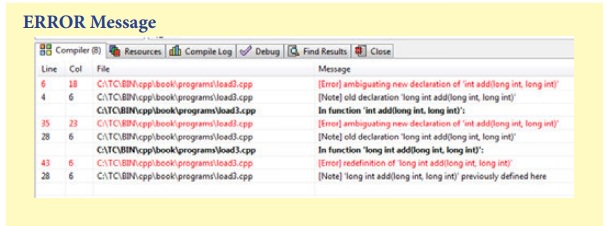Chapter: 11th Computer Science : Chapter 15 : Polymorphism
C++ Function overloading
Function
overloading
The
ability of the function to process the message or data in more than one form is
called as function overloading. In other words function overloading means two
or more functions in the same scope share the same name but their parameters
are different. In this situation, the functions that share the same name are
said to be overloaded and the process is called function overloading . The
number and types of a function's parameters are called the function's signature. When you call an overloaded function, the
compiler determines the most appropriatedefinition to use, by comparing the
argument types you have used to callthe function with the parameter types
specified in the definitions. The process of selecting the most appropriate
overloaded function or operator is called overload
resolution
Need For Function overloading
sometimes
it's hard to find many different meaningful names for a single action.
Consider
the situation to find the area of circle ,triangle and rectangle the following
function prototype is given
![]()
![]()
![]()
![]() float area_circle(float radius) // to calculate the area of
a circle
float area_circle(float radius) // to calculate the area of
a circle
float
area_triangle(float half,floatbase,float height) // to calculate the area of a
triangle
float
area_rectangle(float length , float breadth) // to calculate the area of a
rectangle
This
can be rewritten using a single function header in the following manner
float
area ( float radius);
float
area ( float half, float base, float height );
float
area ( float length , float breadth);
Illustration 15.1 C++ Program to demonstrate function overloading
#include <iostream>
using namespace std;
void print(int i)
{cout<< " It is integer " << i
<<endl;}
void print(double f)
{ cout<< " It is float " << f
<<endl;} void print(string c)
{ cout<< " It is string " << c
<<endl;} int main() {
print(10);
print(10.10);
print("Ten");
return 0;
}
Output:
It is integer 10
It is float 10.1
It is string Ten
Rules for function overloading
1)
The overloaded function must differ in the number of its arguments or data
types
2)
The return type of overloaded functions are not considered for overloading same
data type
3)
The default arguments of overloaded functions are not considered as part of the
parameter list in function overloading.
Illustration 15.2 C++ Program to demonstrate function overloading
#include <iostream>
using namespace std;
long add(long, long);
long add(long,long,long);
float add(float, float);
int main()
{
long a, b, c,d;
float e, f, g;
cout << "Enter three integers\n";
cin >> a >> b>>c;
d=add(a,b,c); //number of arguments different but same data type
cout << "Sum of 3 integers: " << d
<< endl;
cout << "Enter two integers\n";
cin >> a >> b;
c = add(a, b); //two arguments data type same with above
function call and different with below function call
cout << "Sum of 2 integers: " << c
<< endl;
cout << "Enter two floating point numbers\n";
cin >> e >> f;
g = add(e, f); //two arguments similar to the above function
call but data type different
cout << "Sum of floats: " << g <<
endl;
}
long add(long c, long g)
{
long sum;
sum = c + g;
return sum;
}
float add(float c, float g)
{
float sum;
sum = c + g;
return sum;
}
long add(long c, long g,long h)
{
long sum;
sum = c + g+h;
return sum;
}
Output
Enter three integers
3 4 5
Sum of 3 integers: 12
Enter two integers
4 6
Sum of 2 integers: 10
Enter two floating point numbers
2.1 3.1
Sum of floats: 5.2
Illustration 15.3 Default argument and return type are not considered in overloading
#include <iostream>
using namespace std;
long add(long, long);
long add(long long g=0);
int add(long,long); //
[Error] ambiguating new declaration of 'int add(long int, long int)
int main()
{
long a, b, c;
int d;
cout<< "Enter two integers\n";
cin>> a >> b;
d=add(a,b); //arguments and datatype are same but return is
different
cout<< "Sum of 2 integers: " << d
<<endl; cout<< "Enter two long integers\n";
cin>> a >> b;
c = add(a, b);
cout<< "Sum of 2 long integers: " << c
<<endl;
cout<< "Enter a long integers\n";
cin>> a ;
c = add(a); // [Error] ambiguating new declaration of 'int
add(long int, long int)
cout<< "Sum of 2 long integers: " << c
<<endl; }
long add(long c, long g) //
'long int add(long int, long int)' previously defined here
{
long sum;
sum = c + g;
return sum;
}
int add(long c, long g) //
[Error] ambiguating new declaration of 'int add(long int,
long int)
{
int sum;
sum = c + g;
return sum;
}
long add(long c, long g=20) // [Error] redefinition of 'long int
add(long int, long int)'
{
long sum;
sum = c + g;
return sum;
}
ERROR Message

Related Topics